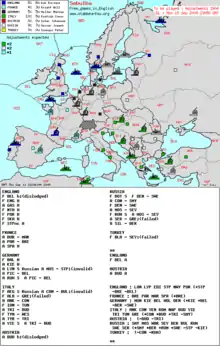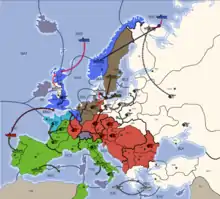Internet Diplomacy
Internet Diplomacy refers to any of a number of online implementations of Diplomacy, a board game in which seven players, each controlling one of the major European powers of the early 20th century, fight for control over Europe.

Instead of communicating face-to-face, as in the board games, or by mail, as in the play-by-mail games, communication and order submission is done over the internet. Typically orders are processed by software, but in the earlier systems a person called a GameMaster would process the orders manually.
Background
Internet Diplomacy is popular for many reasons, including avoiding inconveniences associated with playing the game face-to-face and the lack of availability of local players. Also, a face-to-face game needs up to seven players and can last several hours, which makes it difficult to find enough players with enough free time for a game.
Internet Diplomacy brings together players from anywhere in the world, with deadlines ranging between a few minutes to a few days, and allows players to play multiple games at the same time. The role of GameMaster, depending on the specific implementation, can be minimized to setup and resolution of rules questions/disputes, or even eliminated entirely.
Types
Play by email (PBEM)
Play-by-email internet Diplomacy followed from Play-by-mail games dating to 1970s fan zines. Similar to standard mail games, players originally sent press directly to one another through email, and sent their orders via email to a pre-designated human GameMaster.
| Title | Year | Platforms | Parent | Turn deadline | Bots | Features |
|---|---|---|---|---|---|---|
| Diplomaticcorp | 1999 | Web site | None | 3d - 7d | None | 100% free human-run Diplomacy games and variants since 1999 |
Email judges
As email became more prevalent software Judges were developed, which would route emails addressed from one player to another, and route submitted orders and results to/from human GameMaster(s). As well as routing messages they provided more accountability and security, a place where all the info about the game could be stored and retrieved, and provided a way to keep scores of players from multiple games.
These software Judges were eventually extended to include adjudicators, which are pieces of software capable of resolving orders and producing results, thus replacing the human GameMaster with software. Those adjudicators often had many bugs and only after a few years they became reliable. The Diplomacy Adjudicator Test Cases were written to overcome this problem. With the use of these test cases new programs can be of high quality on first release. The DATC contains also recommendations for ambiguities in the rules.
Variants to the original map and rules were also added to judges. As it is sometimes difficult to find many people who are familiar with the same variant in a face-to-face environment, and the addition of software expanded the possibilities for variants, many variants are specific to Internet Diplomacy, where players can easily download a map and rule-set.
Ken Lowe Judge
The Ken Lowe Judge system was the first judge system to be created.[1] The Ken Lowe Judge system allows users to send press to one another and send orders to the processing server through a variety of text commands. Today, many online adjudication systems run in the same, or similar, fashion to the Ken Lowe Judges.
NJudge
Njudge was a rewrite of the Ken Lowe Judge system, with more support added for different variants. This version of the judge software was created by Nathan Wagner, then Judgekeeper (Administrator for a Judge Server) to clean up issues that arose over the years due to the multiple different programmers who had made adjustments to the original code. This software program continues to be used on a number of email servers.[2]
Web/email interfaces
In recent years as the web has become more dynamic Internet Diplomacy has shifted from email to the web. Due to the complexity of adjudicators and judges, the earliest web implementations primarily provided a web interface to the email based Judges.
One of the main advantages of web-based implementations over previous options is that they can display computer-generated graphical maps of the current board on the web-page, instead of requiring the user to update the positions of the game's units on a physical board based on text output.
The DPjudge
In 1995, Manus Hand created the DPjudge, among the first to use a web interface for an email judge. DPJudge allows players to view maps, game history, enter orders and write press to other players through a web interface, however some features, including signing up for a new game, or filling a vacancy in a game in progress, require email usage. The DPjudge is also able to handle numerous variant maps and rules, in addition to the standard map and rules as published by Hasbro.
Web based
The most recent Diplomacy via web implementations were created for the web from scratch. This gives the advantage of allowing more complex features to be added (e.g. rule variants), but requires that complex adjudicator code be rewritten.
| Title | Year | Platforms | Parent | Turn deadline | Bots | Features |
|---|---|---|---|---|---|---|
| Backstabbr | 2011 | Web based | PlayDiplomacyOnline | 15m - 7d | None | English Sandbox |
| BOUNCED | 1999 | ‹See Tfd›? | ‹See Tfd›? | ‹See Tfd›? | ‹See Tfd›? | |
| Diplicity[3] | 2020 | Web (desktop, pad, mobile), Android | Diplicity | 1m - 30d | None | 100% free, push or email notifications, modern interface, reliability rating, Tribute scoring,[4] TrueSkill rating |
| webDiplomacy | 2004 | Web based | None | 5m - 10d | 6 bots | English Variants Free |
| vDiplomacy | 2010 | Web based | webDiplomacy | 5m - 10d | None | 100+ Variants |
| Stabbeurfou | 2005 | ‹See Tfd›? | ‹See Tfd›? | ‹See Tfd›? | ‹See Tfd›? | English & French |
| playdiplomacy | 2007 | Web based | webDiplomacy | 12h - 7d (live games only for premium members) | None | |
| Conquest of Nations | 2008 | ‹See Tfd›? | ‹See Tfd›? | ‹See Tfd›? | ‹See Tfd›? | |
| Diplomacy by deNes | 2003 | ‹See Tfd›? | ‹See Tfd›? | ‹See Tfd›? | ‹See Tfd›? | |
| DipGame.org | ‹See Tfd›? | ‹See Tfd›? | ‹See Tfd›? | ‹See Tfd›? | 6 bots |
DipGame
DipGame provides a web-interface to an AI server that allows a web-based single-player game against 6 bots (i.e. computer players). It is also possible to save games and to resume later. The website is a beta version and has some known bugs, including a critical one that makes the game stop and impossible to log in again until the webmaster restarts the system and your game is lost (June 2012).
The website was initiated for a PhD research project to provide a Multiagent Systems' testbed developed at the http://www.iiia.csic.es/ IIIA-CSIC in Barcelona. They plan to develop negotiating capabilities for the bots,[5] however these are not available in the web-interface yet (June 2012). It is also possible to download an off-line version to develop your own bots.[6]
Smartphone apps

There are also several implementations for smartphones, like Droidippy, Diplicity (Android)[7] and Conspiracy,[8] all of them free. Realpolitik for Android[9] also has a hot-seat mode for local play. While Subterfuge provides a modern adaptation.
Online service based
The GEnie online service offered fully automated versions of Diplomacy and variants to subscribers.[10]
Intellectual property
The Diplomacy game is in copyright in most of the world, and in addition, Hasbro holds a trademark in the name. All the Avalon Hill intellectual property did not go to Avalon Hill allowing Valley games to reprint under the Avalon Hill title.[11] None of the implementations in this article hold a license from Hasbro.
References
- "What is njudge?" Archived 2012-07-31 at Archive.today by Millis Miller, The Diplomatic Pouch, S2002R, retrieved October 4, 2006
- "DP:Judge current openings list". Archived from the original on 2012-07-24. Retrieved 2006-09-19.
- Diplicity
- Tribute scoring
- Fabregues & Sierra, 'DipGame: a challenging negotiation testbed'. Scientific journal article in prep. at EAAI
- Fabregues & Sierra, 'DipGame: a challenging negotiation testbed'. Scientific journal article in prep. at EAAI
- Diplicity (Android)
- Conspiracy
- Realpolitik
- "A Survey of On-Line Games". Computer Gaming World. May 1993. p. 84. Retrieved 7 July 2014.
- Avalon Hill History